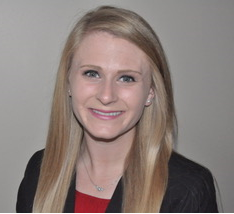Bright Futures
Articles and Updates from Phoenix Children's
I did not have an easy start in school. In first grade, my teacher was convinced I should be held back or moved to special education. I couldn’t read and was falling behind the other children. I dealt with the problem by faking illnesses and escaping to the nurse’s office. It was an age-appropriate response to the struggles I was having in class, but it did little to improve the situation and reinforced my teacher’s opinion that I was not ready for first grade.
My parents, on the other hand, weren’t convinced I needed to repeat the grade or switch into a different program. They knew there was something else going on, and they were determined to get to the bottom of it.
It took nearly the entire school year, but with my mom leading the charge, they figured out the issue: I was dyslexic, and my problematic behavior was the result of my own frustration and worry.
The diagnosis made all the difference. Not only was I eligible for educational support services, but I learned that I was capable of achieving at a high level – especially in math and science. That’s not to say I didn’t struggle. I gritted my teeth, studied all the time and leaned on my family for support.
It was hard work – it continues to be hard work – but the obstacles I’ve faced in life led me to the career I love today. I knew from a young age I wanted to be a doctor, and over time I realized I was in a unique position to help other kids with special needs. Today, it’s a huge part of my work as a pediatrician and an area I’m passionate about.
This Q&A was created to help other families whose children are struggling at school get the answers they’re seeking, understand their rights under the law, access the services their kids need and deserve and chart a new path forward to ensure a rich, full life for their children.
What is a learning disability?
Learning disabilities include a wide range of specific learning challenges that impair an individual’s ability to achieve an expected level of academic performance.
This can include challenges with understanding or using spoken or written language. It may look like a limited ability to listen, think, speak, read, write, spell or complete mathematical calculations.
Learning disabilities do not include problems that result from visual, hearing, motor or developmental disabilities, emotional disturbance or environmental, cultural or economic disadvantage.
How common are learning disabilities?
The medical literature estimates that 9-20% of school-aged children have a reading disability and 6% have a math disability.
When should I be concerned about my child?
Parents know their children best and often have a gut feeling when something is wrong. A learning disability may be present if your child:
- Shows age-appropriate achievement in most developmental areas but lags behind in specific skills
- Struggles to identify letters vs. pictures or numbers; has a hard time with letter names and letter sounds; has difficulty rhyming, separating and blending sounds within words; or has trouble understanding phonics
- Has challenges writing their own name, understanding the spatial aspects of writing or spelling simple words
- Struggles with the names of written numbers (like “four” or “fifteen”); doesn’t understand concepts such as less than, more than or equal to; has trouble adding and subtracting numbers; does not grasp the meaning of math symbols (like + or =)
What should I do if I suspect my child has a learning disability?
First, check in with your child’s teacher about appropriate academic milestones for the grade level. For example, a child in second grade should be writing letters. A student in fourth grade should be mastering two-digit multiplication. Understanding these benchmarks will give you a sense right away if your child is on track.
Second, look at the schoolwork your child completes without any help from parents, older siblings or classmates. Make note of the comments the teacher provides. If your child continues to receive the same comments and seems to be making minimal or no improvement, this is a red flag.
A silver lining of COVID-19 has been the opportunity for parents to work much more closely with their children on schoolwork. If your child is continuing to learn online, take note of any areas that provide considerable difficulty.
Finally – and most importantly – stay in regular contact with your child’s teacher. You are working in partnership to help your child succeed and can make a much bigger difference together.
How do I arrange for my child to be tested for a learning disability?
Before your child can receive special education and related services for the first time, a full evaluation must be conducted to determine if a disability is present.
As a parent, you have the right to request evaluation at any time. If your child is enrolled in private school, you can arrange for testing at the public school in your area.
Our nation’s special education law, the Individuals with Disabilities Education Act (IDEA), requires schools to perform a complete screening to determine if a referral to special education should be made within 45 days of your written request. Once the team determines that concerns persist and evaluations are necessary, the case manager generates a consent to evaluate form. Once parents sign the permission to evaluate form, the special education team has 60 days to complete formalized evaluations. There are rare circumstances where the team can request a 30 day extension to the 60 days to get all of the necessary evaluations done. The law also says that you are not required to furnish medical verifications or any other documentation in order to proceed with testing.
What does testing include?
Testing may include an IQ test and/or grade-level assessments in reading, writing, math and all other areas of learning.
The purpose of the test is to determine if your child has a disability (as defined by IDEA), to gather insights that will help inform the child’s educational needs and to guide decision making about educational programming and support services now and in the future.
What happens if my child is diagnosed with a learning disability?
Once the testing is completed, you will sit down with the diagnostician and your child’s teacher to discuss next steps, including development of an Individual Education Plan (IEP).
IDEA requires that this plan contain measurable annual goals designed to “meet the child’s needs that result from the child’s disability to enable the child to be involved in and make progress in the general education curriculum and meet each of the child’s other educational needs that result from the child’s disability.”
How does an IEP work if my child is learning from home?
Many students continue to learn online amid the pandemic. While this presents some challenges, IEPs have been modified to accommodate virtual learning. Kids should be receiving the same services over Zoom. If your child is not receiving services, contact your teacher, principal or your district’s special education department.
My child has struggled for many years. Is it too late to intervene?
Absolutely not! It is never too late to help. Your advocacy for your child is the single most important factor in accessing services and support that will make a difference in the immediate future and over the long haul. Learning disability symptoms tend to persist throughout adulthood – they never really go away – kids just learn how to overcome the challenges they pose (and often become stronger, harder-working and more resilient as a result).
Even if it seems impossible right now, all kinds of possibilities are within your child’s reach, from academic achievement and improved self-esteem to educational and employment opportunities in the future.
Who knows where I would be if my parents hadn’t fought for me? Today – in spite of incredible challenges in school – I have fought my way to a career I love and the opportunity to help children whose potential is just waiting to be unlocked.


